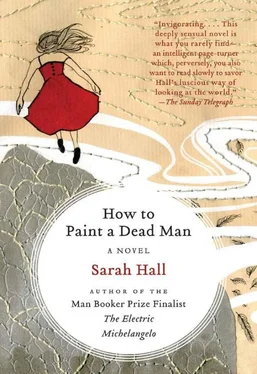Sarah Hall - How to Paint a Dead Man
Здесь есть возможность читать онлайн «Sarah Hall - How to Paint a Dead Man» весь текст электронной книги совершенно бесплатно (целиком полную версию без сокращений). В некоторых случаях можно слушать аудио, скачать через торрент в формате fb2 и присутствует краткое содержание. Год выпуска: 2009, Издательство: Harper Perennial, Жанр: Современная проза, на английском языке. Описание произведения, (предисловие) а так же отзывы посетителей доступны на портале библиотеки ЛибКат.
- Название:How to Paint a Dead Man
- Автор:
- Издательство:Harper Perennial
- Жанр:
- Год:2009
- ISBN:нет данных
- Рейтинг книги:4 / 5. Голосов: 1
-
Избранное:Добавить в избранное
- Отзывы:
-
Ваша оценка:
- 80
- 1
- 2
- 3
- 4
- 5
How to Paint a Dead Man: краткое содержание, описание и аннотация
Предлагаем к чтению аннотацию, описание, краткое содержание или предисловие (зависит от того, что написал сам автор книги «How to Paint a Dead Man»). Если вы не нашли необходимую информацию о книге — напишите в комментариях, мы постараемся отыскать её.
, Sarah Hall, "one of the most significant and exciting of Britain's young novelists" (
), delivers "a maddeningly enticing read... an amazing feat of literary engineering" (
).
How to Paint a Dead Man — читать онлайн бесплатно полную книгу (весь текст) целиком
Ниже представлен текст книги, разбитый по страницам. Система сохранения места последней прочитанной страницы, позволяет с удобством читать онлайн бесплатно книгу «How to Paint a Dead Man», без необходимости каждый раз заново искать на чём Вы остановились. Поставьте закладку, и сможете в любой момент перейти на страницу, на которой закончили чтение.
Интервал:
Закладка:
I have crept away and closed the door of the bedroom, saying I will rest for two hours, but truthfully I want to try to work. It is my habit to wait until the last possible moment before applying paint to the canvas, and I know that this period of meditation is long, often taking weeks, but then the image is always quick to produce. I am a little impatient now for the commencement. Even when commissioned I have never felt myself to be limited in this way. My thoughts are elsewhere. She is in my mind so often. There will be two interviews this week. Antonio is keen not to exhaust me, so he has selected the most reputable journalists and then I will be left alone. We all understand the significance. I know they will ask me about my life and the meaning of my work. I know they will ask if there are regrets, and I do not know what I will tell them.
Dina wore a white lace corset for our marriage, the waist of it drawn tight enough to grind pepper. Lace from the South, with its pauper’s history, its deliberation of stitches. This is a country of bitter and lovely traditions. She was veiled and underneath her hair was like burnt vines. I mourned for Christ on behalf of the congregation and asked for our union officially. I was ten years her senior but I felt young. Her smallness beside me in the church was startling. I imagined she was standing barefoot, her toes on the cold stones, as if in crisis. It was in 1934 and Fascism was noble and Mussolini had not yet told us anti-Semitism did not exist in our country. We were married in the Catholic tradition. She was among the faithful and gave up her ring to the Fatherland after ten months.
She thought me romantic for eventually confessing to her that I prayed every day for the jewel in her hair to fall into my wine, so that I might have had reason to solicit her attention. I told her I had longed to place it back in its dark setting. She thought me avant-garde because I was a target for much debate in the café, but it was not truly so, nor was it my ambition. In one journal I was called the Italian Le Corbusier, and she asked me about this and whether she might visit my studio in the Accademia. I was nervous for her to see the work, but she was kind and not disappointed. When she first sat with me, it was the moment I knew myself to be visible to all the eyes of the world. Her perfume was violet. She was too beautiful. I could not hold her gaze. Instead, I studied the pattern of the tablecloth, the red and blue squares. It was she who courted me and I who was ridiculous.
Our first apartment was in Bologna, close to the stadium, and I was teaching etching. My income was not high. The apartment had two rooms and loud pipes, and the bathroom was communal with no lock, so at first we were too afraid to use it. We would make sure to wake before all the other residents and then turn on the taps and sing while we bathed. We felt like operatic fugitives. There was no room to paint as well as cook, so I worked in the bedroom. After a successful exhibition, there were several patrons. I was able to sell more work and we moved to a better apartment on the Via Fondazza. But I remember her laughter in the old place and the beautiful sound of her singing and the dripping of the taps. I remember the sighs of our lovemaking against the roaring of the crowds in the stadium when the ball was taken towards the opposition. By then ill feelings were beginning to come into the country, but we paid them no heed.
Perhaps I was sombre in my middle years. I was so earnest about my work and could not express myself. How must I have appeared to her? Perhaps not fully developed, but solvable, so she would try all the time to make me smile. I could not convince her of my happiness though I felt it daily. I felt it in the strands of her hair left on the basin, which I jealously collected so that our fellow bathers would not wind them around their fingers. It was my wife’s habit to imitate those in power and the police captains, and often she would dress up in my hats and pencil a moustache, and this theatre brought us much amusement. I look back on this and it was harmless. Yet Europe’s terrible legacy has left traces of paranoia in my mind. Perhaps we were too casual. Perhaps oblivious to the dangers.
Sometimes Dina would try to unlock me. She would deprive me of sleep, sitting for hours at the window in her nightdress, asking questions, and imagining ways to cure me of the reticence from which she felt I suffered. Once she told me that my silence was able to break the spirit of all the things around me, the spirits of the fireplace, the washstand, the bowl of almonds and the photographic album, even the spirit of the womb. I do not know if she truly believed me capable of this. I blamed my age for our childlessness, but after seven years our daughter was finally conceived. Her name was Elizabeta. Because of the misalignment in her mother’s pelvis the delivery was difficult and she was born with broken bones. From birth she had no appetite and gained no weight, though she lay perfectly against the blanket. She lasted five weeks in this world.
I seldom dream. I would gladly accept dreams of my daughter or my wife. I would buy them if I knew the currency with which to do so. Perhaps dreams are the bonds of a frugal God. Or perhaps they are mirages that the thirsty soul falls upon. But I would walk each desert of the world to see Elizabeta. I would not hesitate to give my own life in exchange for Dina’s. I would have given up my country’s patronage and its protection in those dark years, if it meant she could have been saved. I have thought this too many times to count.
No sun was brighter than the love Dina possessed for our child. Even the surgeon’s prediction did not convince her that her maternal involvement would be temporary. After the birth we sat together outside the hospital looking at the designs of Erba, and those carved angels seemed vile to me. Their eyes were deeply recessed and empty where the chisel had struck down, deep holes, which were the lair only of the stone-worm. We took Elizabeta home, though it was not recommended.
After the baby died a mania came to Dina. She went from room to room looking for her. She lifted the tablecloth. She opened bulbs of fennel. She was alert to any possible hiding place. At night she heard noises in the alleyways like the mewling of a newborn, but it was only stray cats singing to each other across the roofs. Once she broke the bones of her hand looking for her small bundle in the awnings of the café. She was as lean and hungry as the wolves on the lakes of ice, scratching at the doorway of another world.
She visited the new synagogue on the Via dei Gombruti in the years that followed, until it was damaged in the bombing, but she seemed to find no comfort there. During the war there was much fear and suspicion. The prayer rooms in the Jewish ghetto were often closed, and the faith could not be practised openly, but it was only when a Jewish man was shot on the Via dell’Inferno that Bologna the Learned began to take the threat of intolerance seriously. Perhaps it was Dina’s faith that exposed her during the occupation. She was a proud woman. The Resistenza was fierce in our city, and I have no doubt that she knew many members, but we were careful and our friends were loyal, and the priests and servicemen did their best to offer shelter. Nevertheless, one night I came back from the Accademia and the doorway of the apartment was standing open. A neighbour told me that the building had been searched, and the old medieval heart of the city had been raided and cleared. I ran from room to room but Dina was gone.
I had sold paintings to a man in office at the time. I contacted him and begged him to help. He made an appeal to the German security police, but there was little else he could do. Later, he found her name in the transport records. I remember sitting with him in an empty café in the district of the Two Towers, where Dina had been a child, as he gave me this, the only available proof. I remember him taking hold of my sleeve as I stood up to leave. This is not our great system, he said, this is not what we conceived. And I said to him, no, but neither will we be forgiven.
Читать дальшеИнтервал:
Закладка:
Похожие книги на «How to Paint a Dead Man»
Представляем Вашему вниманию похожие книги на «How to Paint a Dead Man» списком для выбора. Мы отобрали схожую по названию и смыслу литературу в надежде предоставить читателям больше вариантов отыскать новые, интересные, ещё непрочитанные произведения.
Обсуждение, отзывы о книге «How to Paint a Dead Man» и просто собственные мнения читателей. Оставьте ваши комментарии, напишите, что Вы думаете о произведении, его смысле или главных героях. Укажите что конкретно понравилось, а что нет, и почему Вы так считаете.












